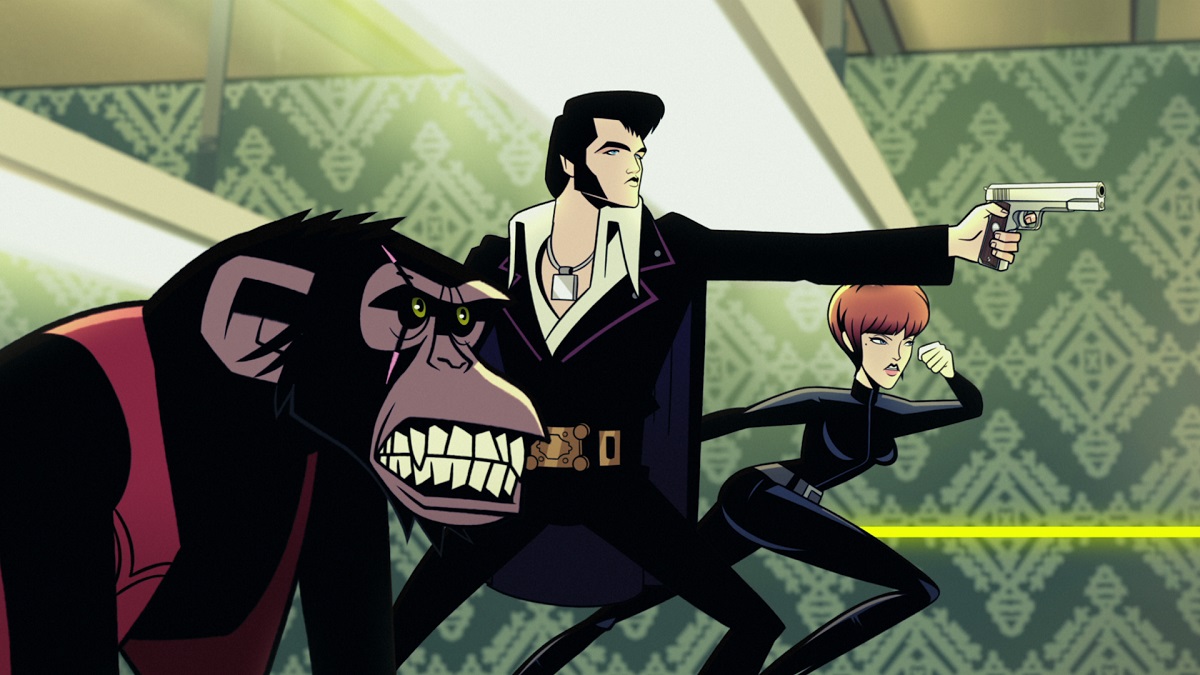The trend of celebrity figures with their own cartoons has been in style for a while. Older Gen-X audiences grew up with Saturday morning cartoons about Mr. T, Muhammad Ali, and Chuck Norris, all of which capitalized on their stardom to young viewers. Viewers of the late millennial-early Gen-Z variety, like me, had the supernatural Kids WB series “Jackie Chan Adventures.” In the 2010s, the trend pivoted to mature audiences via Adult Swim’s “Mike Tyson Mysteries.” It was only a matter of time before the King of Rock ‘N’ Roll followed suit with an adult-animated spy series, this one co-created by ex-wife Priscilla. While all eyes were on Baz Luhrmann developing his Elvis passion project, Priscilla was doing her own thing with “Agent Elvis.” Due to Luhrmann’s animated style, we really got two Elvis cartoons within the past 12 months, if you think about it.
Elvis Presley (voiced by Matthew McConaughey) leads a double life. By day, he’s the superstar rock ‘n’ roll musician everyone knows and loves. By night, he’s a crime-fighting vigilante who delivers beatdowns as brutal as Batman. Right by his side is his dim-witted-yet-skillful chauffeur Billy Ray (Johnny Knoxville), his alcoholic, cocaine-snorting, sex-addicted chimpanzee Scatter (Tom Kenny), and his no-nonsense manager Bertie (Niecy Nash-Betts). When done with his heroic duties, he returns home to Priscilla (voiced by herself), unaware of his crime-fighting lifestyle. During one of his solo stunts, Elvis was recruited by cynical special agent Cece (Kaitlin Olson) to become a spy under a secret government program called TCB. Under the watch of The Commander (Don Cheadle), the short-fused and eccentric head of the TCB, Elvis embarks on various missions to stop a dangerous hypnotic weapon while grappling with a past he can’t remember.

“Agent Elvis” pops with vibrant colors and a graphic noir 2D-art style full of sharp geometric edges and thick outlines reminiscent of Gerard Way, Jamie Hewlett, and Genndy Tarkovsky, with the latter being a major influence for its course of violence, bloody action. As Elvis is thrust into action by the first dozen minutes of the inaugural episode, the level of passion poured into the artistry and style is worn on its sleeve, staying on its kinetic wavelength throughout the series. Its heavily inspired graphic novel aesthetic comes to life when the aspect ratio constantly forms different shapes and sizes like comic panels, along with action lines of eye-popping VFX techniques filling the background. It’s telling how much glee the animators at Vancouver-based studio Titmouse had when constructing the fast-paced action sequences. Robert Valley’s distinct geometric character designs pair well with Chris Thompson’s art direction, providing a broadened scope as grand as a globetrotting James Bond flick.
The adventures follow quasi-episodic, quasi-story-driven spy quests (a la “Archer”) either riffing on the pop culture events of the time—Elvis facing off against Charles Manson (Fred Armisen) and the Manson Family—or notable Elvis’ career milestones, like when he infiltrated the White House and met an outright racist Nixon. All the historical revisionist missions vary in quality and creativity, but the novelty of each premise wears off quickly.
As Sony Animations’ first venture into adult animation, “Agent Elvis” falls into the trappings of too many other adult-animated comedies, emphasizing vulgarity as the basis of humor rather than focusing on clever writing. The dark comedic tone of “Agent Elvis” attempts to break away from the shadow of other adult-animated spy comedies but fails to carve out its identity. Like “Archer,” here’s another lead portrayed as a womanizing sarcastic wisecracker with an inflated ego, who happens to be a highly skillful killing machine, paired up with a firecracker cynic. Whenever the comedic banter is set between an annoyed Elvis and controlling Cece (essentially Lana Kane mixed with Olson’s “It’s Always Sunny in Philadelphia” character Dee Reynolds), the joke misses more than it hits. Many supporting players compare too much to the same offbeat character dynamics between the Archer crew but with an Elvis coat of paint.

The few characters to cast their light are Elvis’ wild card chimp Scatter, hilarious whenever onscreen, especially when set on his cocaine-fueled sub-plots, and The Commander, whose short-temper and unpredictable dialogue often warrants a good belly laugh.
It’s quite a shame the writing doesn’t provide the best material for its stars, for they all bring a fun, free-spirited liveliness to the scene with Matthew McConaughey at the helm. Thankfully he provides his natural Texan accent to the Tennessee superstar rather than going for his best Elvis impersonation. The series also has good guest voice cameos, including people within the real Elvis bubble like the late Ronnie Tutt, funk legend George Clinton, and even “Elvis” filmmaker Baz Luhrmann himself.
Despite its high-octane, colorful, inspired stylization and delightful graphic action-violence, Agent Elvis falls short in providing consecutive laughs and original spy ideas that quickly wear out their welcome. While a talented voice cast led by an energetic McConaughey attempts to elevate the overall energy. it’s not enough to give a solid rubbernecking recommendation.
On Netflix today.












